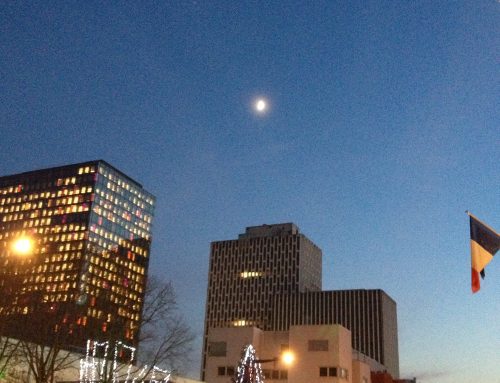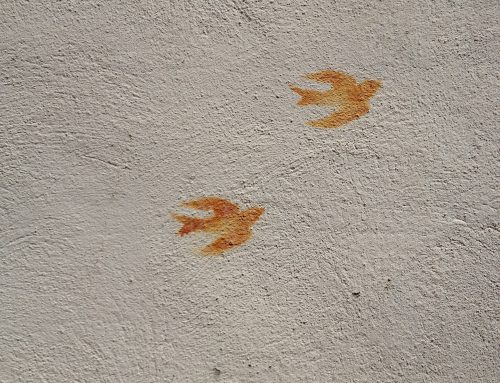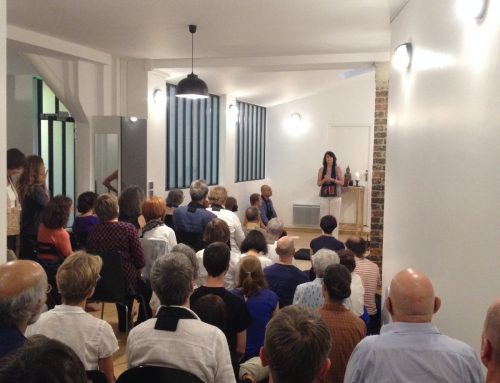Back from Portugal, a journey across five days, two countries, many encounters old and new.
In Lisbon, up hills and down, along the river, then into the deepening night where I am pressed with questions about form. Which might better be called expressions of attachment to form in the guise of rejection of a particular form: Why this? someone asks, confusing rejection with freedom.
In Mira, night is the roaring sea, day a roaring silence of sitting. We call it a retreat, a weekend. It is neither. The lights go out in mid-sentence. Too bad they are restored in no time.
Sunday, again the glow of Lisbon. A restaurant, each face at the table a reflection of the whole. More questions. No theory, no technique! Plates are filled and emptied, ginger juice is fiery.
Up before 6 on Monday after restless sleep overlooking a splendid jardin andalous. Green tea with generous hosts, then airport-bound. Paris is a thought away.
Every moment is Giacomettric, a magnificent failure of starting again in the face of unending now, wind-whipped, at home.













Excellent question.
When I said “Sublime Clingings of a Buddha”, I expected someone to make a tasteless joke about the opposite “Sublime Droppings of a Buddha”.
Fortunately that didn’t happen.
I am proud of you all.
And I hope you understand that I struggle with the English language, like I struggle with Zen, with life, with internet, with people, with myself.
My goodness! What would I be without struggle?
A Clinging Buddha!
Yes! Ha-ha, that’s me!
I like that twist of words.
All my hang-ups, my “interesting stories” and my stubbornness are really the Sublime Clingings of a Buddha.
Is there anything that is not your home? When clinging, are you perhaps a clinging Buddha?
The questions are rhetorical I suppose.
So forgive my pointless answer:
Yes, there is great freedom in acknowledging my negative emotions, just as there is great freedom in acknowledging my joy.
Bet neither emotion is my home.
Acknowledging and embracing them does not imply clinging to them and perpetuating them.
True nature is homeless so it can not ever be away from home.
"To be me and to be free of me", I think, is the challenge to be authentic and in touch with my deeper emotions, without turning any of them into a fixed identity or ego.
Words. Can I feel pressed and be free? Can I be worried, tired, sad and free? Can I embrace my fears and joys and (seeing their nature) embrace them, be me and free of me?
I just noticed the exchange of words around your post on the trip to Portugal.
In some things I sympathize with Ting, on the grounds that some (many?)buddhist experiences in the West become dangerous adventures: Chögyam Trungpa’s alcoholism, his american successor transmitting AIDS to a disciple and causing his death, some american zen revolving around vanity and money… Westerners want weird things from Butsudo or from their gurus/senseis! They want to be accepted, to be praised, to fit in, to succeed, to appear intelligent, to get another feather in their radical or exotic cap, they want to have a new experience, to be saved, God nows what else – and that often leads to disaster.
But I liked to see you dance around his/her words, his defiance and anger. Taking all in doesn’t mean to be brainless or to be submissive, but seeing things for what they are, not going after nor avoiding something because of fear, of preconceptions, of the prison of our mind: being unattached to meanings, not denying them nor taking them as dogma; being unattached from roads cannot mean taking them all (there are not enough legs) nor taking every one that appears ahead, but not choosing from a conditioned point of view, paranoia, obedience, habit, pride, lazyness… Like someone said, zen is "not doing": of course you always do something, but you don’t strive, don’t explain, don’t drown in goals or in the hunger to achieve. I liked to see you saying "yes" to his wish that "no" could be said, by not taking a road of confrontation. I suspect somewhere there was a koan. I suspect he/she could even be right but chose to be right the wrong way.
More empty words? More dogs chasing their own tails? Me trying to be noticed or please you? I cannot dance. I complicatedly strive to be simple. For a guy who knows words are as empty as anything else, I have some heavy ones always shooting from my mouth. Scholastics or Navy Seals training would seem light as a feather compared to me trying to be zen. But I’m grateful for those that make the world different and better than I can.
Janis Joplin: "Freedom’s just another word for nothing left to lose."
Or win, I might add.
And the Third Patriarch of Zen: "The perfect way is not difficult; it just dislikes picking and choosing."
By the way, I had a delicious pear for breakfast.
This started with some discussion you said you had in Portugal. Fortunately I have no idea what that discussion was about. But something triggered me into “taking sides” anyway.
Years ago a Buddhist group (not related to yours) fell apart. I witnessed it form the inside.
I could see in people around me and in myself, a complete change of perception, happening in hours or days.
Everything we believed that was good and important in our lives suddenly looked stupid and evil. All the things we chose not to see for years suddenly were there in the spotlight of our attention.
I am getting to my point.
Some of us looked back in anger saying things like “Fifteen years of my life were stolen from me.” Or “All the time I put in this community was wasted.”
And of course “I want my money back!”
But although we were manipulated and although there was some level of “group pressure”, we always had a choice. There were no walls and no guards. We were free to come and free to go. And we were free to speak our minds.
People who did speak their minds were scorned and excluded, so they paid a price, but they proved it could be done.
I hope that people in your sangha are free to say “no” when they feel like doing so.
And if they do, I hope you do not scorn them and the rest of the sangha does not throw them out their social network.
Freedom is priceless.
In a sangha – worthy of the name – freedom is highly valued.
A sangha is not a cult. The key difference must be the absence of manipulation and abuse.
All members of a sangha have the responsability to protect themselves and others against manipulation and abuse.
Watch me!
The subject, the object and the process of rejecting are all of the same void nature.
No problem.
So are you having breakfast? Ask, yourself how can you eat what is not there?
How can you reject what is not there?
Yes, part of it.
“No” is a good word, if we use it properly.
Reject what’s going, going, gone?
The glow of Lisbon.
What is there to reject?
Hi Tu,
The way I see it the Zen master can order any pizza he likes or no pizza at all.
No need to swallow every garbage they put on the menu!
We can reject to be abused, to be manipulated and to be told nonsense.
No need to be doormats.
We can stand up for ourselves and for people who can not defend themselves.
No need to be blind followers.
I’m beginning to like this idea of rejection.
Am I annoying you already?
Reject me!
What kind of pizza does the Zen master order? One with everything.
«… expressions of attachment to form in the guise of rejection of a particular form… »
Every form can be defined as an expression of freedom or as an expression of attachment. There’s no escape from that.
I can not avoid making choices (not making a choice being a choice too).
And every choice I make (in favor or against) can be seen as an expression of attachment or as an expression of "attachment in the guise of rejection of something opposite".
All of that is just manipulative language.
The discussion is pointless and forms are meaningless.
Freedom can not be defined.
So how can you feel pressed?